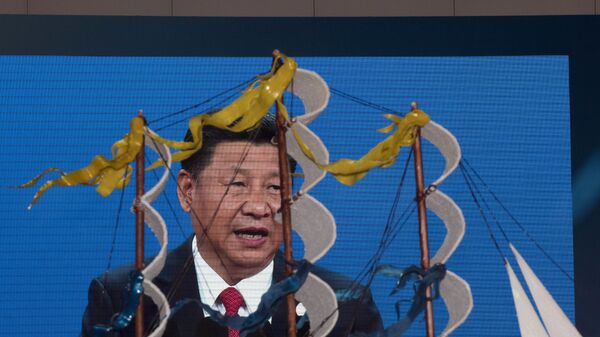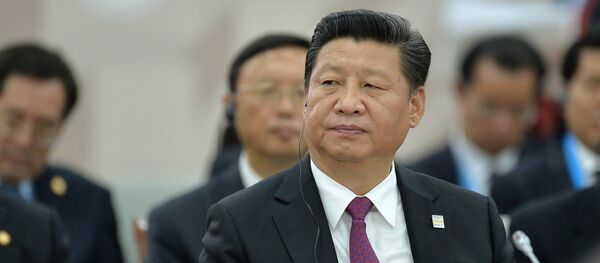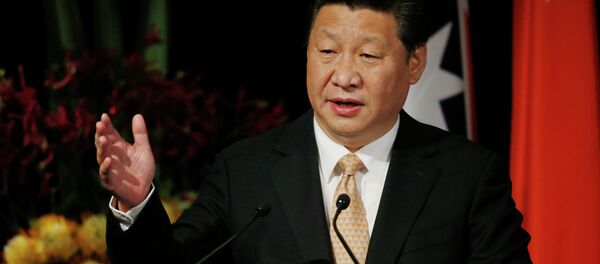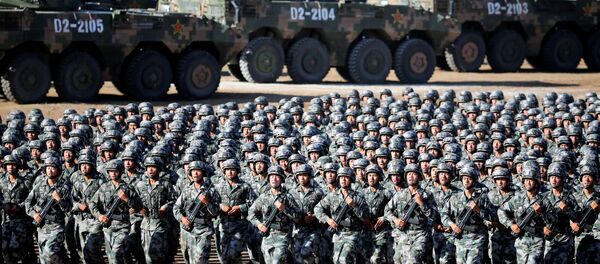Xi’s Purges and Flat No to Corruption
For the communist country, the past five years have been a period of sweeping reforms and multiple challenges. For a start, Xi chose to transform the ruling party and introduce progressive measures for better inter-party discipline.
READ MORE: Chinese Lawmakers Rule to Abolish Presidential Term Limit, Enshrine Xi's Ideas
Having thus secured the country’s political unity, he embarked on an all-embracing anti-corruption campaign, which saw more than a million high- and low-level officials, as well as former officials, punished for their malfeasance.
Under the ideology commonly referred to as the "Chinese Dream," coined back in 2012-2013, Xi outlined the sweeping reforms that China plans to implement through 2020, many of which are now under way.
Technology Comes First
The technological revolution, namely in the IT domain, is one of the landmarks of Xi’s first term. Now, despite being partly isolated from the global Internet, the Chinese are able to hail a cab, book tickets or even buy groceries via smartphones – which were still relatively unheard of before 2012.
China to Overtake US in Environmental Race?
He has also been praised for his hard line on environmental polluters and his pledge to eliminate extreme poverty in the country by 2020. For instance, back in 2012, the term that garnered special attention was "Ecological Civilization," (EC) a phrase literally included in the Chinese Communist Party Constitution.
Under the framework of Ecological Civilization, Xi claims to contribute in tackling climate change issues, as well as push for energy transformation and build up China’s renewable energy sector. Back then, Xi described the EC in the most romantic terms: "green mountains and waters are golden and silver mountains and waters.”
On top of that, as President Donald Trump pulled the United States out of the Paris Accord last year, President Xi Jinping, by contrast, staked out China’s ambition to be a committed player in tackling climate change. Critics then even started speculating on whether China would outpace the United States as the new world’s environmental leader.
China’s largely ceremonial parliament overwhelmingly endorsed a controversial constitutional amendment on Sunday to remove presidential term limits, thereby paving the way for President Xi Jinping to stay in power indefinitely. 2,958 votes for the amendment, 2 against, 3 abstain.
— Will Ripley (@willripleyCNN) 11 марта 2018 г.
Second Largest Economy
Under Xi Jinping, in 2015, China became the first-ever nation to have a GDP exceeding $20 trillion, having doubled its overall output in just six years. As China has confidently secured its status as the second largest economy in terms of purchasing power parity according to the IMF, China's Renminbi also enjoys considerable growth and is undergoing internationalization. Separately, China masterminded the founding of the Asian Infrastructure Investment Bank in 2015, whereas its most promising Shenzhen province has been dubbed the world’s next Silicon Valley.
READ MORE: 'Clean Up Gang Crime, Eliminate Evil': Behind Xi's New War on Corruption
It is also worth noting the Silk Road Economic Belt and the 21st-century Maritime Silk Road, or otherwise called the One Belt and One Road Initiative. This is China’s development strategy focused on cooperation between Eurasian countries, primarily China and the land-based Silk Road Economic Belt (SREB), as well as the ocean-going Maritime Silk Road (MSR). The strategy, first introduced by Xi Jinping in September 2013, signifies China's determination to take a larger role in global affairs with a China-centered trading network, which comprises a whopping over 68 countries.
Many congratulations to my best friend Xi Jinping on his indefinite presidency--don't forget me, homie!
— Tudley (@Thoirdealbhaigh) 11 марта 2018 г.
Also, China has been the world's largest manufacturing economy and exporter of goods since 2010 – the year when it officially overtook the US.
Firm Stance in Foreign Policies
Under Xi, China has taken a more critical stance on North Korea, while striving for a better relationship with South Korea, which it succeeds in. China-Japan relations have soured under Xi's administration, particularly due to the dispute over the Senkaku/Diaoyu islands. In November 2013, following Japan's firm stance on the issue, China declared an Air Defense Identification Zone.
China makes Xi Jinping President for life. Now imagine if the US, North Korea, Turkey and the Philippines did the same. Thank god for democracy and the right to change our minds for better or for worse.
— Pritish Nandy (@PritishNandy) 11 марта 2018 г.
Separately, Xi has developed stronger ties with Russia, especially in the wake of the 2014 Ukrainian crisis, when Crimea reunified with Russia. In the meantime, despite the original vector on the strengthening of diplomacy with the US, the relationship soured following China’s massive hack and theft of 22 million records of the US Office of Personnel Management.
High-Teck Military in Focus
In the past years, the Chinese military has been undergoing a sweeping reform focused on boosting its combat capabilities, command and coordination efficiency. According to the official data, by the end of 2017, it was expected to reach 2 million troops. China has also invested a lot in technological modernization of all segments of the defense forces.
Cultural Bonds
To unite the masses culturally and perhaps to substitute a now less popular communist ideology, Xi Jinping has gone on to rehabilitate ancient Chinese philosophical figures like Han Fei into the Chinese mainstream thinking alongside Confucianism, both of which Xi sees as crucially important.





